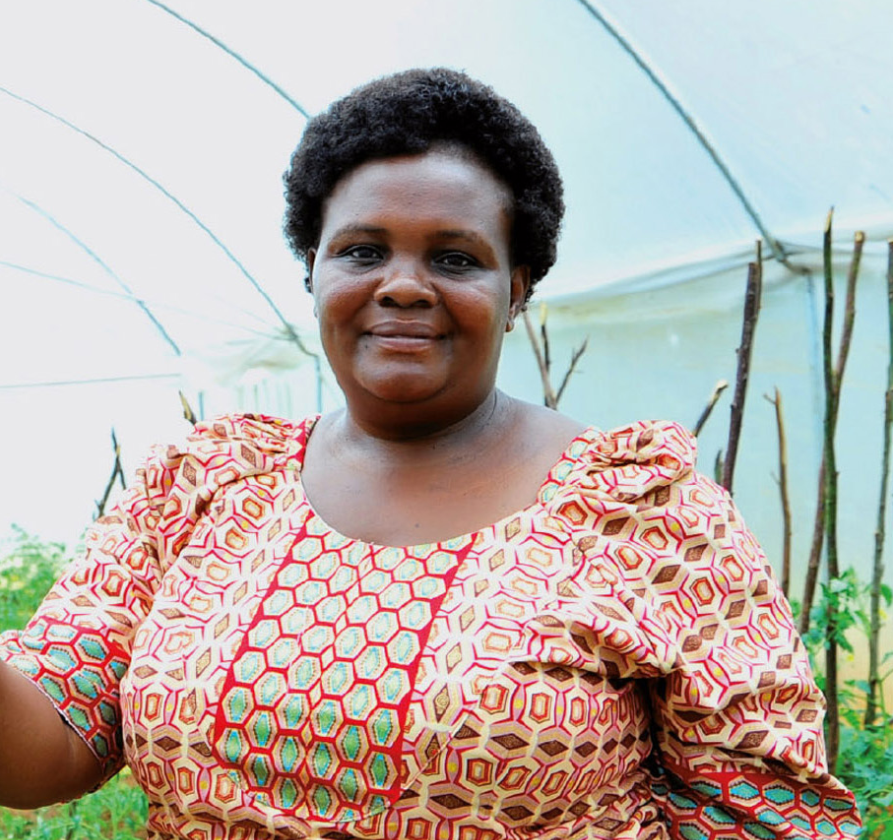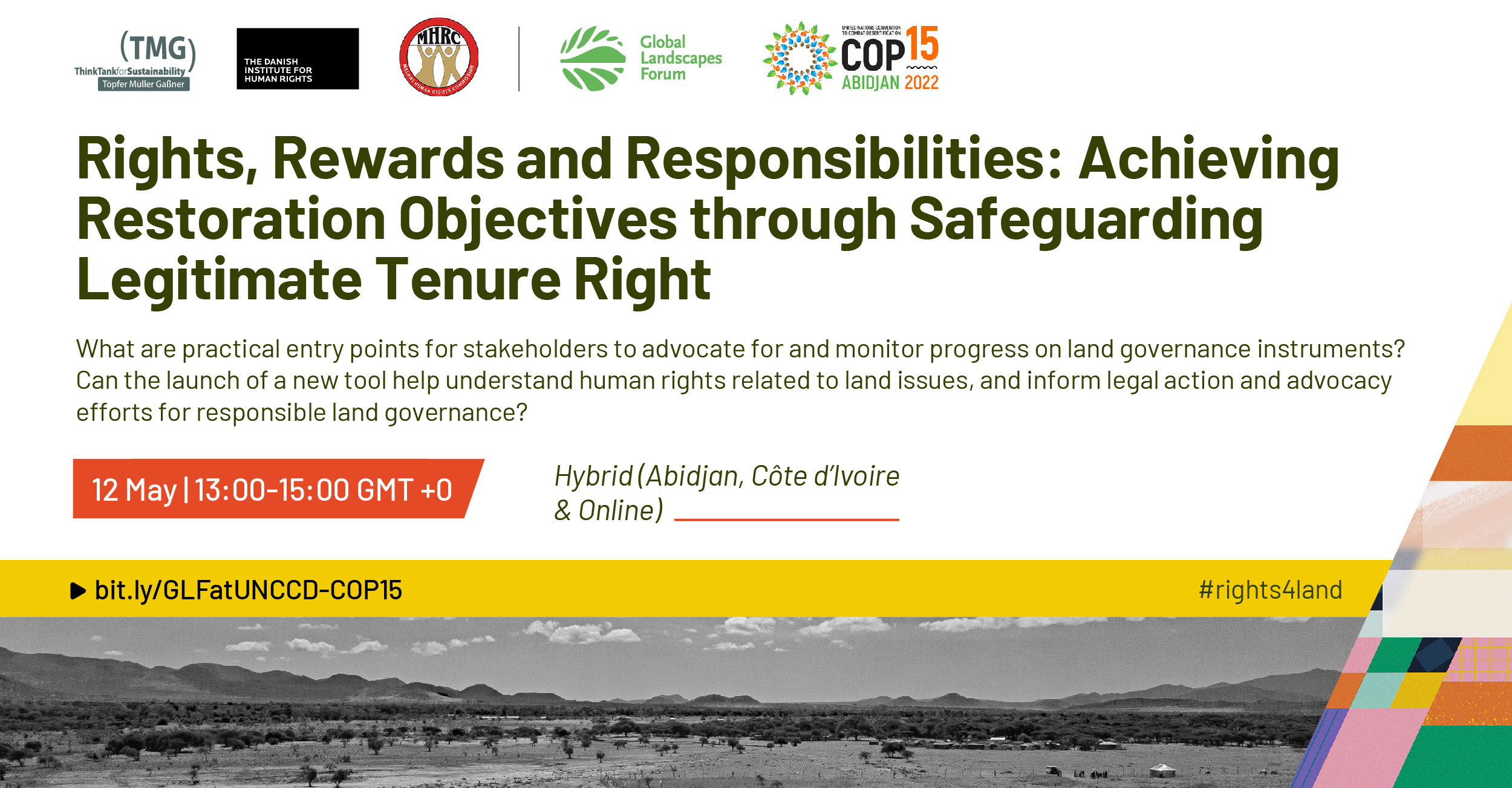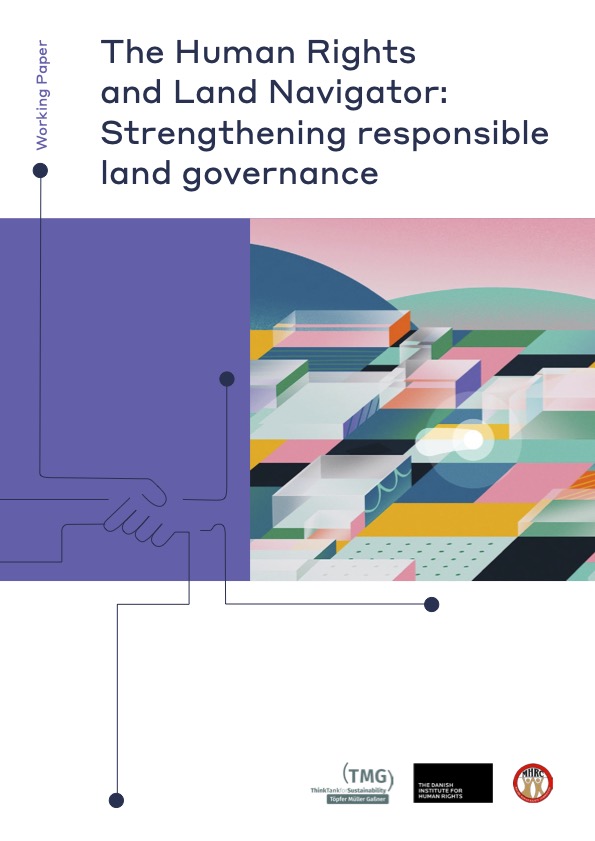Discussion
Rights, Rewards and Responsibilities: Achieving restoration objectives through safeguarding legitimate tenure rights
Introducing tools to operationalise the Voluntary Guidelines on the Responsible Governance of Tenure of Land to facilitate their use by UNCCD stakeholders and restoration actors
Droits, récompenses et responsabilités : Atteindre les objectifs de restauration en sauvegardant les droits d'occupation légitimes
-> Access the livestream here <-
Despite an overall recognition of the human rights foundation of the Voluntary Guidelines on the Responsible Governance of Tenure of Land, Fisheries, and Forests in the Context of National Food Security (VGGT), human rights-based approaches to their application need to be strengthened. With the support of the German Federal Ministry for Economic Cooperation and Development (BMZ), TMG Research, the Danish Institute for Human Rights and the Malawi Human Rights Commission therefore developed a human rights-based approach to land governance monitoring.
The Human Rights and Land Navigator is a reference tool showing how binding human rights obligations underpin the voluntary guidelines on responsible land governance (VGGT). Linkages with more than 20 human rights and 12 human rights instruments, such as UNDROP or ILO C169, have been established. These linkages can be retrieved by applying different filter options of the online tool. This approach has the potential to increase accountability of the state to apply the VGGT and to fulfil its human rights obligations related to secure access to land for marginalized land users.
This event will aim to launch this new tool and to discuss with UNCCD stakeholders and human rights actors the potential of the international human rights system and the Human Rights and Land Navigator to enhance the implementation of the VGGT and to safeguard legitimate tenure rights for ecosystem restoration.
-> Accéder au livestream ici <-
Malgré une reconnaissance générale du fondement des droits de l'homme des Directives volontaires sur la gouvernance responsable des régimes fonciers applicables aux terres, aux pêches et aux forêts dans le contexte de la sécurité alimentaire nationale (VGGT), les approches basées sur les droits de l'homme pour leur application doivent être renforcées. Avec le soutien du Ministère fédéral allemand de la Coopération économique et du développement (BMZ), TMG Research, l'Institut danois des droits de l'homme et la Commission des droits de l'homme du Malawi ont donc développé une approche du suivi de la gouvernance foncière basée sur les droits de l'homme.
Le Human Rights and Land Navigator est un outil de référence qui montre comment les obligations contraignantes en matière de droits de l'homme sous-tendent les directives volontaires sur la gouvernance foncière responsable (VGGT). Des liens ont été établis avec plus de 20 droits de l'homme et 12 instruments de droits de l'homme, tels que l'UNDROP ou la C169 de l'OIT. Ces liens peuvent être retrouvés en appliquant différentes options de filtrage de l'outil en ligne. Cette approche a le potentiel d'augmenter la responsabilité de l'Etat dans l'application du VGGT et dans le respect de ses obligations en matière de droits de l'homme concernant l'accès sécurisé à la terre pour les utilisateurs marginalisés.
Cet événement aura pour but de lancer ce nouvel outil et de discuter avec les parties prenantes de la CCD et les acteurs des droits de l'homme du potentiel du système international des droits de l'homme et du Human Rights and Land Navigator pour améliorer la mise en œuvre du VGGT et sauvegarder les droits fonciers légitimes pour la restauration des écosystèmes.
Insecure land tenure for smallholders deters investments in ecosystem restoration and undermines food security and land-based adaptation options for millions of people around the world. The imperative of safeguarding legitimate tenure rights is likely to become even more urgent as the global community scrambles to achieve food security, carbon neutrality and biodiversity protection. Failure to secure legitimate rights might lead to land conflicts and human rights violations.
By adopting its hallmark decision on land tenure, UNCCD COP 14 took a key step towards safeguarding legitimate tenure rights in land degradation neutrality policies, programs and projects. Further, by adopting the decision, Parties to the Convention revived the spirit of the 2030 Agenda which aims to achieve its goals and targets in an integrated way to realize the human rights of all (UNGA Resolution A/RES/70/1).
Building on the theme of the high-level roundtable on “Rights, Rewards, and Responsibility”, TMG Research gGmbH, the Malawi Human Rights Commission, and the Danish Institute for Human Rights propose this event that coincides with the 10-year anniversary of the Voluntary Guidelines on the Responsible Governance of Tenure of Land, Fisheries and Forests in the Context of National Food Security (VGGTs). It introduces human rights-based tools to operationalize the VGGTs to facilitate their use by UNCCD stakeholders to secure land rights of vulnerable communities for ecosystem restoration.
L'insécurité foncière des petits exploitant.e.s dissuade les investissements dans la restauration des écosystèmes et compromet la sécurité alimentaire et les possibilités d'adaptation par la terre pour des millions de personnes dans le monde. L'impératif de sauvegarder les droits fonciers légitimes risque de devenir encore plus urgent à mesure que la communauté mondiale s'efforce d'assurer la sécurité alimentaire, la neutralité carbone et la protection de la biodiversité. Si les droits légitimes ne sont pas garantis, cela pourrait entraîner des conflits fonciers et des violations des droits de l'homme.
En adoptant sa décision phare sur les régimes fonciers, la 14e Conférence des Parties à la CCD a fait un pas important vers la sauvegarde des droits fonciers légitimes dans les politiques, programmes et projets de neutralité de la dégradation des terres. En outre, en adoptant cette décision, les Parties à la Convention ont ravivé l'esprit de l'Agenda 2030 qui vise à atteindre ses objectifs et ses cibles de manière intégrée pour réaliser les droits de l'homme de tous (Résolution A/RES/70/1 de l'AGNU).
S'appuyant sur le thème de la table ronde de haut niveau "Droits, récompenses et responsabilité", TMG Research gGmbH, la Commission des droits de l'homme du Malawi et l'Institut danois des droits de l'homme proposent cet événement qui coïncide avec le 10e anniversaire des Directives volontaires pour une gouvernance responsable des régimes fonciers applicables aux terres, aux pêches et aux forêts dans le contexte de la sécurité alimentaire nationale (VGGT). Il présente des outils basés sur les droits de l'homme pour rendre les VGGTs opérationnelles afin de faciliter leur utilisation par les parties prenantes de la CNULCD pour garantir les droits fonciers des communautés vulnérables pour la restauration des écosystèmes.
The Human Rights & Land Navigator
A new instrument instrument for strengthening the application of the voluntary guidelines on tenure
May 09, 2022
Date
Time
15:00 - 17:00 (UTC+2)
Organisers
TMG Research
Danish Institute for Human Rights
Malawi Human Rights Commission
Location
Hybrid (Abidjan, Côte d'Ivoire & Online)
Languages
English
French

Adriano Campolina
Food and Agriculture Organization (FAO)

Alastaire Sèna Alinsato
Ministry of Planning and Development, Benin

Gabriel Ferrero de Loma-Osorio
UN Committee on World Food Security and Ministry of Foreign Affairs, Spain

Jes Weigelt
TMG Research

Makhumbo Munthali
Malawi Human Rights Commission (MHRC)

Maria Ploug Petersen
Human Rights and Development, The Danish Institute for Human Rights

Mario Boccucci
UN-REDD Programme

Miriam Medel Garcia
United Nations Convention to Combat Desertification Secretariat

Sebastian Lesch
German Federal Ministry for Economic Cooperation and Development

Therese Arnesen
UN Human Rights Office

Violet Shivutse
Shibuye Community Health Workers




